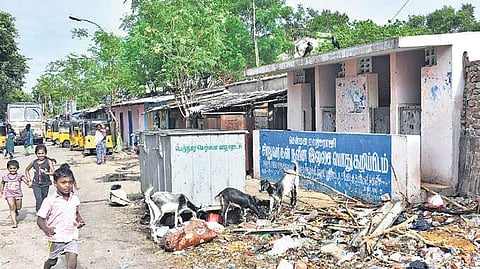

CHENNAI: The toilet bowl overflows, the doors are broken and stray faecal matter lies everywhere at a children’s free public toilet in SM Nagar slum near Rajiv Gandhi Government Hospital. Waste from the large metal dustbins outside the public toilet has overflown into a smelly mound of trash. Children from the slum defecate near the pile on the road as the toilets remain vacant in an unusable state.
The modern free toilet for children in the slum is just one of the many public toilets in the city, which cannot be used due to their pathetic conditions. While a large number of toilets exist on paper, not many are usable in reality. Open defecation is still a very common habit in Chennai slums.
These toilets, built under different schemes and across the years, face the same fate of being neglected by the Greater Chennai Corporation. Toilets often become redundant within months after construction, as locals have a tough time deciding who among them should clean the toilets.
Another toilet in Kodungaiyur’s RR Nagar slum is a full-fledged house with electricity connection. A politically powerful family has encroached upon the house and made it into a living space. Another public toilet in a slum behind Park Town railway station is home to cattle. Goats are tied in the space, and toilet bowls act as feeders.
A public toilet in Saidapet is functional as the residents themselves have taken up maintenance. A Muthulakshmi from the slum is in charge of cleaning. “People have to pay `1 to urinate and `2 to defecate,” she declares. Every month, she collects the money and uses it to buy disinfectants and cleaning equipment.
Another partially functional toilet at SM Nagar itself works with a similar system. While the contractor, appointed by the the Greater Chennai Corporation, occasionally comes to fix structural damage, the maintenance is left to the locals.
P Kumari, an old local, who maintains the toilet, says proudly that she cleans the toilet every day. After years of neglect, the toilet was renovated recently and she was appointed as the cleaner. She only earns a small margin from the coins she collects from users.
Only women, however, use the toilet as it provides safety.
A walk into the toilet, that Kumari is proud of, reveals a different picture. The inside of the toilet is dark in the middle of the day and more than half the doors have been removed and the rest are broken. Women defecate in the toilet cubicles that don’t have doors. Water has to be fetched from open common tanks inside the toilet.
“The open water tanks cause a serious mosquito problem in the slum, and within the toilet itself. We can’t even sit for five minutes in peace,” says J Sangeetha, a resident of the slum.
A senior official from the solid waste department in the Corporation said that maintenance would come under the purview of the zonal officers.
Another official from the buildings department said that zonal officer had been instructed to issue tenders for undertaking of maintenance. The official, however, said that he did not have information on the number of tenders issued so far.
Two zonal officers told Express that buildings departments would be issuing tenders for all public toilets in the city and that they were waiting for that tender to be floated.